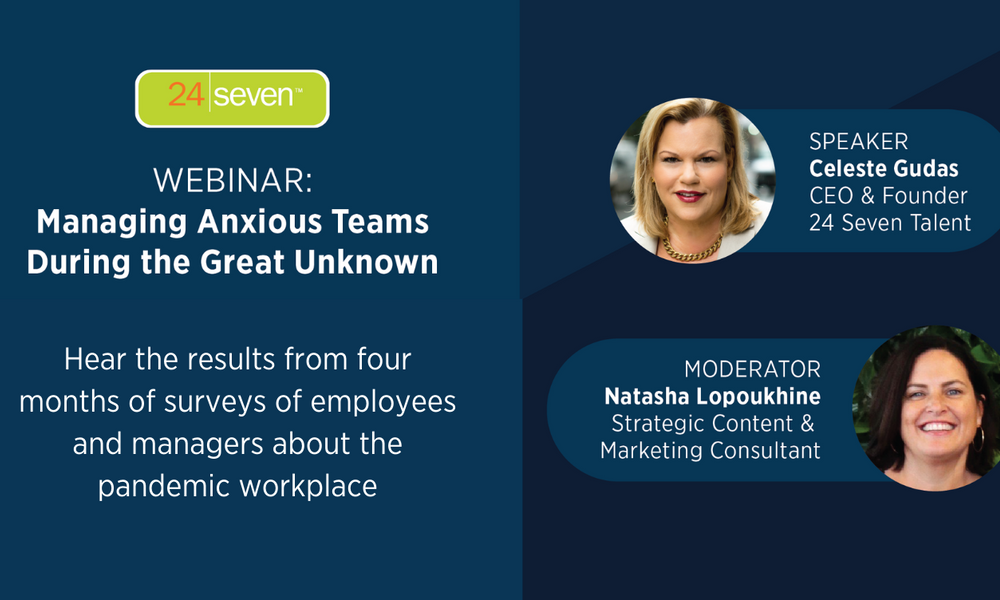Last week in a well-received and attended webinar, Managing Anxious Teams During the Great Unknown, we shared insights we’ve gathered in online research we conducted since the pandemic began of employees and those who lead them across business sectors we serve. Providing a leadership and personal perspective on the findings was 24 Seven’s own founder & CEO, Celeste Gudas. Here’s a recap, and further below, a link to download a recording of the webinar:
The Early Pivot & Managing Disruption
Our studies during the pandemic have found that most employees feel like their companies have done a great job transitioning to work from home, managing operations, and keeping employees informed. For one-third of companies, the pandemic forced them into remote work in any form for the first time. Most companies had to lay off or furlough employees, but hiring freezes are thawing. Gudas shared commonalities of companies who were most successful during this time, including stepping up communication frequency and clarity, investing in the tools & tech to foster remote work success, and realigning organizational go-to-market strategies and talent plans. She also underscored how managers are being called to balance the need for employee productivity versus self-care.
Making Sure that Working From Home Is Working
Over the past decade when 24 Seven has conducted talent research, remote work has perennially been a coveted feature of employment. In the early days of the pandemic, there was high interest in working from home. Since experiencing the remote work reality, about a quarter want to work exclusively from home, and 1 in ten don’t ever want to work from home again. Gudas spoke about how to support employees as they juggle working from home versus living at work. She also covered how to ensure company culture continuity in a remote reality and considering how perks and benefits must evolve for the new normal.
Preparing for a Return to the Office
A plurality of employees surveyed believe there will be some form of return to the office in the fall. Just over half believe their employers will keep them health secure at work. Nine in ten employees believe a company’s ability to do this is critical to the employer brand, and they would consider it heavily before taking a job with a company. Gudas spoke about the challenges of planning a return to the office and balancing costs, risks, accommodations with employee safety. What workplace model works for the various cohorts within the workforce? She stressed the importance of transparent and authentic communication and education of employees to ensure their buy-in, engagement, and workplace happiness.
Employee Mental Health Matters
Participants in our most recent research have said they are experiencing high levels of anxiety and feelings of job insecurity. Employees said they feel afraid to take time off or share their struggles with managers. There is increased awareness that mental health is under additional strain and that employees need more mental health support from their employer. Gudas stressed how important it is for companies and their leaders to be sensitive to this increased anxiety and the possibility of burnout. Companies should consider expanding benefits and services to support teams, but also taking actions that show employees that employers care. Ideas included limiting meetings, sending meals and snack packages, expanding emotional support perks that consider the whole family, and offering subscriptions to mindfulness or talk therapy apps, and more.To watch the full recorded webinar, Managing Anxious Teams During the Great Unknown, click here.
